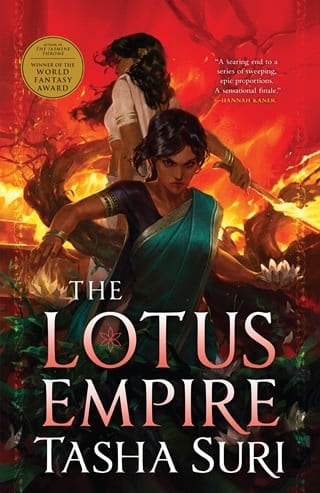Chapter 67 Arahli Ara
ARAHLI ARA
Ashok was dreaming.
He was drowning. The water was deep and blue, and then not blue at all. The waters were a darkness so vast it had no color. Stars raced through it, as keen and cold as thrown blades. He was trying to swim to the surface, but he did not know where the surface lay. His lungs were full of water. He was dying. He had, perhaps, been dead a long time.
He saw Riti and Sanjana and Nandi reaching for him, tangled in weeds like golden chains. Their eyes were empty. Their hands when they grasped him were cold. They were mottled blue, drowned, their clothes floating around them in white clouds.
Priya , he thought. Bhumika. My foolish sisters. I’m sorry. I tried—
Arahli Ara opened his eyes.
Yaksa did not dream like this.
He went to Taru Ara first. She was sleeping on the mahal’s roof, curled in a bed of jasmine flowers. From her perch, the edges of the forest were visible. From here, he could hear and feel the Parijatdvipan army, bristling once again on the borders of Ahiranya. But this time, he could not simply laugh at them. The mortals had killed a newborn yaksa.
This time, he and his kin were… changed.
There was a strange pallor to Taru’s skin: a brownness of mortal flesh, flushed with red mortal blood. Her torso, beneath the masking perfume of flowers that surrounded her, smelled of human decay.
She had wept when they had felt their kin in Alor perish. Wept like a mortal, fever in her veins and her wound rotting her from the inside.
He placed a hand against her brow. The skin of his hand was no different from her own.
No time , he thought. The panic clawed in his throat. He could not deny it any longer. Taru Ara’s wound, their strange skin, the humanity stealing over him, the dreams…
They had sacrificed so much of their green to return and survive. They had donned faces of their dead worshippers. They had consumed mortality. And this was the cost. This awful fleshliness.
He had not known it would be like this.
When Mani Ara returned it would be better, he told himself. She was the most powerful of them. She would fix everything.
He pressed his forehead to Taru Ara’s. Sister , he thought, in a voice that wasn’t his own. She did not stir.
He thought of the temple children. He would take one—the oldest maybe, the boy Ashish—to the deathless waters. He would guide him in. Make a once-born of him. If they did not have Priya any longer, he could make more worthy vessels for the greatest of his kin. He left Taru Aru to seek the children out, his heart pounding, nausea a roiling sea in his belly.
The temple children were not in their beds.
His rage was heard all through the mahal—the trees shook and the birds took flight.
They were gone .
Cira Ara was the newest of them, and still the most green-veined in all the ways that mattered. She led Arahli Ara and his kin through the woods, following the subtle echo of their footsteps in soil, the whispers of trees. Arahli could not feel as she could. His senses were clumsy, dulled by the blood in him.
“Of course I feel them,” she said merrily, flashing her sharp teeth in joyful malice. “Do you not, dear kin? Shall I kill the ones that are not temple children, flay them as an example?”
“No,” he said. He could feel another presence. Ganam. Anger kindled in his breastbone. “Go to Ganam. Take Avan Ara with you. Keep him restrained. I’ll find the children.”
He and Bhisa Ara and Vata Ara sought the children who were on the seeker’s path. Ashish saw them first—turned, and widened his eyes, and screamed, “Run!”
The children fled, but not swiftly enough. Arahli’s kin turned the earth, bidding it to swallow them to the knees. Stuck fast, they sobbed. They were easy to collect—to tie with vines and guide back toward the edge of the forest.
Ganam was kneeling, lashed with vines, face set with rage. Next to him, Avan Ara was trembling. A blade lay on the ground beside him, violently cracked in two.
“He was carrying this,” Avan Ara said. He jerked his chin at the blade.
Arahli Ara walked toward it and kneeled. He brushed only a fingertip against it and felt a repulsive emptiness—a negation of his own magic. He recoiled. He understood why Avan Ara had sought to shatter it.
He looked at Ganam. “Traitor,” he whispered.
But Ganam was not looking at him. His eyes were on the children, his expression shattered, all grief.
“Rukh,” he said. “Why are they all here? I told you to run.”
“I’m sorry,” Rukh said miserably, his fingers white where they gripped Bhumika’s child. “I couldn’t leave without them. When you told me to run, I told the others to come with me. I had to try.” He swallowed. “I’m sorry.”
Ganam closed his eyes in defeat.
“I should kill you,” Arahli observed, “for what you’ve done.”
“If you kill me you’ve got nothing left,” Ganam said. “No temple elders. No Bhumika. No Priya. Just—weeping children. And you’ve got no time to test them, have you? The Parijati are coming. You’ve only got me.”
“I should kill you anyway,” Arahli Ara said.
“Do what you want,” Ganam said. “I’ve got no regrets. Kill me, then. It makes no difference.” His jaw was set. “I’ll probably die when you throw me into the waters again anyway. So kill me now if you want. I don’t care.”
Viciousness curdled in Arahli’s blood.
“I do not need the boy, Rukh,” he said, low. “Perhaps I will kill him instead. That would serve to punish you.”
One of the children behind began to sob.
“Hush, Pallavi,” Ashish said, drawing her to his side. “It’s okay. Hush.”
Rukh did not make a sound. His expression was set, his chin raised.
A dizzying memory shot through Arahli Ara’s skull. A child’s weight in his arms. Fire in his throat, his eyes. Death at his heels.
Don’t look, Pri. Don’t look—
“Yaksa,” a voice called.
Figures, standing among the trees. He had felt them approaching but thought little of it. They were his own people—worshippers, and outsiders who had sworn loyalty. They had heard his rage and followed his steps.
One stepped forward, a Parijatdvipan man. He bowed low to the ground.
“Yaksa,” he said again. “Great ones, I beg you to give this honor of fighting the Parijatdvipans to us. We are fully grown and trained for war, and faithful to you. Let us drink deep of the waters. Let us fight for you.”
“It will not make temple elders of you,” Bhisa Ara observed.
“You are not worthy,” Avan Ara said.
“We saw Ruchi drink waters broken from the source, and we saw her perish. We know what the cost of service is. But we would gladly take up this glorious burden,” the man said, determined.
“Shyam,” Ganam said roughly. “Don’t do it.”
“The children will grow strong and serve you in years to come,” the man said, not looking at Ganam. His whole focus was on Arahli and his kin, seeking them with his eyes, imploring them with every line of his body. “Let us drink and die for you now, so they may live.” Finally, he looked at Ganam, then the children. “All of them,” he said. “In return for our faithful service.”
His words washed over Arahli Ara like relief, like a tide, and took the memory of a child Priya in his arms with them. Yes. Let the children live for now. Yes.
“Anything,” he said indulgently, “for our loyal worshippers.”
 Fullepub
Fullepub 



